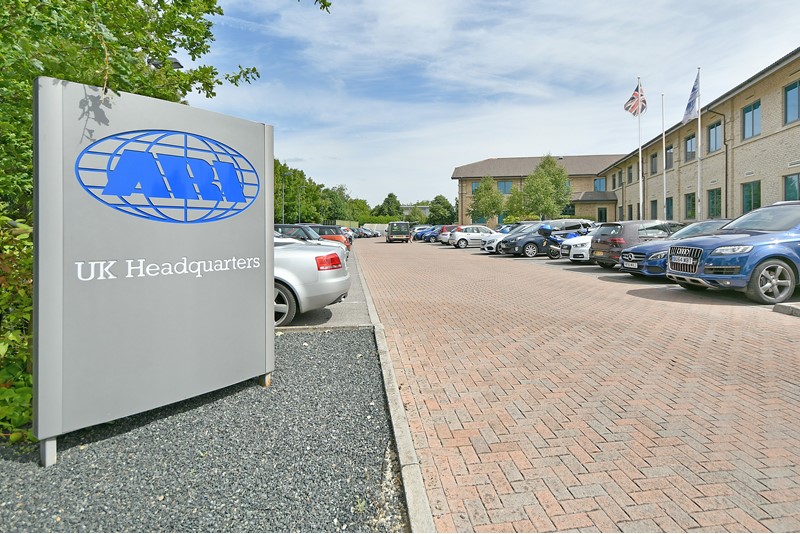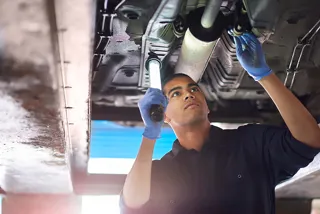Amid all the chaos and uncertainty of Covid-19 and the double lockdown, ARI has found a little quiet time for some introspection. With a new man at the helm of the UK operation since September 2019, the chance to reflect on the broad portfolio of services and take soundings from long-standing customers has led to a more focused business. All energy is now put into its core proposition of fleet management and the growing opportunity offered by finance lease funding.
UK managing director Nick Caller (pictured) describes the previous 15 months as “a time of learning”. He came from outside the industry, having been a customer of ARI while head of procurement at HP. His purchasing background stretches back 21 years.
“This enabled me to challenge the status quo,” Caller tells Fleet News during his first media interview.
“If you ask the ‘stupid’ questions, you often get interesting answers.”
His introduction to the business has been complicated by the pandemic. But changes to working practices throughout the UK, with many people spending more time working from home, did shine a light on the need for exceptional communication.
“It was clear that customers were demanding more communication. Our core strength is our transparency, but we had to communicate even more than before,” Caller says.
Company updates
ARI set up bi-weekly customer forums where it provided company updates. But the meetings also became a vehicle for peer-to-peer communication among its customers. Problems were resolved, such as the fleet which had a shortage of vehicles connecting with another business that had a surplus – they ended up sharing assets.
One of the biggest challenges was managing network logistics among its 500-plus independent service and repair workshops. ARI frequently had to shift vehicles from one site to another due to Covid-induced closures. And with a large proportion of its circa 120 customers labelled as essential services, volumes remained high.
“However, the lockdown has offered us the time to look at our core areas. For good intent, we had in the past tried to be all things to all persons. We wanted to delight our customers,” Caller says.
“If I look at it through a buyer’s lens, you want suppliers to be experts in their core fields and not be all things to all people. You are looking for operational excellence in that area of expertise.”
This moment of enlightenment led the business to start assessing how it could standardise its products. “We asked customers and we gave them what they wanted, not the nice-to-haves. I didn’t have an agenda about what great looked like – I let our customers tell us.”
Key services as standard
ARI’s two products are branded ‘Complete’ for fleets operating cars and vans (“our traditional sweet spot”) and ‘Complex’ for those with trucks and O-licence requirements. Key services are included as standard with a menu of optional extras, including accident management, compliance management and 24-hour support.
“We shifted a lot into options and said this is what we are focusing on as our core. Core is what we offer to 80% of our customers and the other 20% is the flexible add-ons,” Caller says.
“Traditional SMR (service, maintenance and repair) is still at the heart of what we do; we are still a fleet management business.”
Coronavirus didn’t just create the space in which ARI could review its core proposition; it also put the spotlight on its funding business – a flexible alternative to traditional funding, says Caller.
It highlighted that our finance lease product is disruptive.
'We were able to help customers with their lease portfolio and minimise their costs,” he says. “It (Covid) reinforced that this is another core area that we want to focus on – it is a product that I want to aggressively grow.
“There are more corporates out there looking at the opportunity to outsource their fleet management and funding. Often, this is driven by fiscal pressures. The current environment has identified new customers that we didn’t envisage going to market due to those fiscal pressures.”
His growth aspirations will be driven by funding over the next three years, targeting cars, vans and trucks.
The current base point is low; “several thousand units” is all the detail Caller is willing to divulge. “I expect us to grow that five times within three years,” he adds.
“We have a KPI (key performance indicator) that is aligned to the (Fleet News) FN50; we have mapped out our aspiration to be a top 10 player within five years.”
'Wraparound service'
That would require a funding book of at least 50,000 vehicles, based on 2020 figures. The expectation is that those fleets would also be fleet management customers, meeting ARI’s goal of providing a “wraparound service to our funding product”.
To reinforce that proposition, ARI is investing heavily in its portfolio management service, a standard part of both Complete and Complex products. It provides the added value dazzle and has data at its heart.
“We have our own data from 100,000 (UK) assets and company data from two million global assets,” says Caller. “It gives customers insight into, for example, when parts are likely to fail on a vehicle or the optimal time to replace a vehicle.
“We can say to a customer ‘come out of that vehicle in two months because it will either cost you more in maintenance or the residual value will give you the most back’. Or we can say ‘stay in that vehicle because now isn’t the best time to replace’.”
A crucial element is the Insights management platform which is being developed to better bring together data and knowledge to provide fleets with actionable insights that lead to clear outcomes.
Cars, vans and trucks remain at the heart of the ARI business and its growth aspirations. The 100,000 vehicles under fleet management are split 80% under Complete (cars/vans) and 20% under Complex, “although they are 80% of the work”, says Caller.
Both sectors have plenty of potential, although ARI only targets companies operating at least 25 vehicles and stays away from freight. Its preferred market has around 2.5 million cars and vans and 400,000 HGVs.
“Generally, the traditional Complete business is often an entry point, but that conversation quickly morphs into the heavies. The Complex side could become a greater share of our overall business, but I don’t ever see it getting to parity,” Caller says.
“We also expect to see a continued move away from company cars, be that to affinity schemes or cash. And this leads to the mobility agenda. The past few months have given people cause to reflect on mobility and what it means. There are still lots of unknowns.”
Reasons for caution
Those unknowns give Caller reason to take a cautious approach.
He explains: “I don’t want us to be at the forefront of mobility. There’s a lot to be shaped yet about what the customer actually wants. I’m happy for others to make the big investments and we will look at the outcomes, while partnering at a global level across the supply chain.”
ARI parent company, US-based Holman Enterprises, has been working closely at the global level with manufacturers on vehicle connectivity, having identified the benefits to fleet management of having access to reams of real-time data.
“I look at the car of the future as being a mini data centre; an aggregator of data that we can share real time,” Caller says.
“Locally, we are wait and see; globally we are investing. We will be able to leverage that as we move forward.”























Login to comment
Comments
No comments have been made yet.